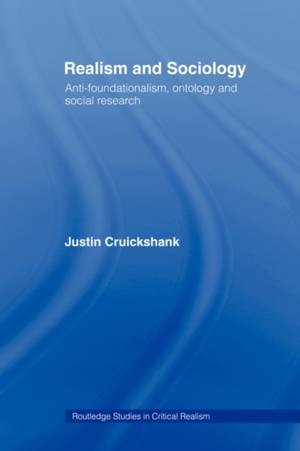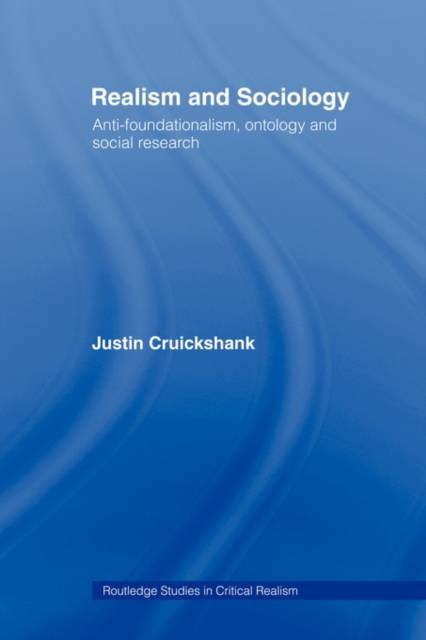
- Afhalen na 1 uur in een winkel met voorraad
- Gratis thuislevering in België vanaf € 30
- Ruim aanbod met 7 miljoen producten
- Afhalen na 1 uur in een winkel met voorraad
- Gratis thuislevering in België vanaf € 30
- Ruim aanbod met 7 miljoen producten
Zoeken
€ 100,95
+ 201 punten
Uitvoering
Omschrijving
In recent years, methodological debates in the social sciences have increasingly focused on issues relating to epistemology. Realism and Sociology makes an original contribution to the debate, charting a middle ground between postmodernism and positivism.
Critics often hold that realism tries to assume some definitive account of reality. Against this it is argued throughout the book that realism can combine a strong definition of social reality with an anti-foundational approach to knowledge. The position of realist anti-foundationalism that is argued for is developed and defended via the use of immanent critiques. These deal primarily with post-Wittgensteinian positions that seek to define knowledge and social reality in terms of 'rule-following practices' within different 'forms of life' and 'language games'. Specifically, the argument engages with Rorty's neo-pragmatism and the structuration theory of Giddens. The philosophy of Popper is also drawn upon in a critically appreciative way.
While the positions of Rorty and Giddens seek to deflate the claims of 'grand theory', albeit in different ways, they both end up with definitive claims about knowledge and reality that preclude social research. By avoiding the general deflationary approach that relies on reference to 'practices', realism is able to combine a strong social ontology with an anti-foundational epistemology, and thus act as an underlabourer for empirical research.
Critics often hold that realism tries to assume some definitive account of reality. Against this it is argued throughout the book that realism can combine a strong definition of social reality with an anti-foundational approach to knowledge. The position of realist anti-foundationalism that is argued for is developed and defended via the use of immanent critiques. These deal primarily with post-Wittgensteinian positions that seek to define knowledge and social reality in terms of 'rule-following practices' within different 'forms of life' and 'language games'. Specifically, the argument engages with Rorty's neo-pragmatism and the structuration theory of Giddens. The philosophy of Popper is also drawn upon in a critically appreciative way.
While the positions of Rorty and Giddens seek to deflate the claims of 'grand theory', albeit in different ways, they both end up with definitive claims about knowledge and reality that preclude social research. By avoiding the general deflationary approach that relies on reference to 'practices', realism is able to combine a strong social ontology with an anti-foundational epistemology, and thus act as an underlabourer for empirical research.
Specificaties
Betrokkenen
- Auteur(s):
- Uitgeverij:
Inhoud
- Aantal bladzijden:
- 184
- Taal:
- Engels
- Reeks:
Eigenschappen
- Productcode (EAN):
- 9780415436854
- Verschijningsdatum:
- 1/03/2007
- Uitvoering:
- Paperback
- Formaat:
- Trade paperback (VS)
- Afmetingen:
- 152 mm x 229 mm
- Gewicht:
- 276 g

Alleen bij Standaard Boekhandel
+ 201 punten op je klantenkaart van Standaard Boekhandel
Beoordelingen
We publiceren alleen reviews die voldoen aan de voorwaarden voor reviews. Bekijk onze voorwaarden voor reviews.








